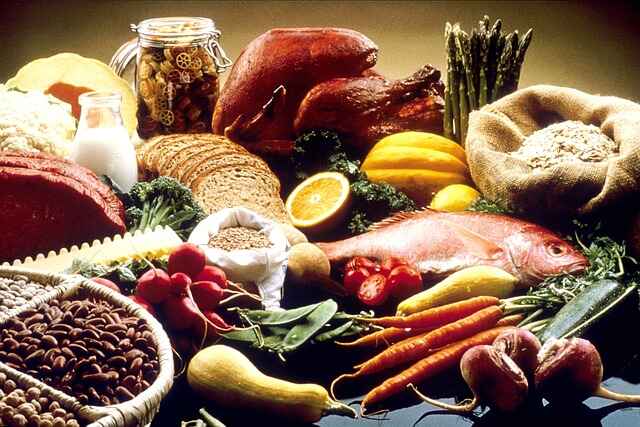What Is Vitamin B12?
Vitamin B12 or Cobamalin is a water-soluble vitamin. It plays a very important role when it comes to the growth and operation of brain and nerve cells. It aids in the production of red blood cells, ensures the maintenance of a healthy nervous system, and helps in utilizing folate by the body. Although quite essential, the body cannot make B12 on its own.
Functionally, Cobamalin binds to the protein (intrinsic factor) in the foods so that it can be easily absorbed down into the small intestine.
What Are The Functions of Cobamalin?
Red Blood Cell Formation: Vitamin B12 is essential for the production of red blood cells. It works in conjunction with folate (vitamin B9) to help form healthy red blood cells. A deficiency can lead to anemia, where the blood lacks enough healthy red blood cells to carry oxygen to the body’s tissues. (Source)
Neurological Function: B12 is vital for the health and function of the nervous system. It is involved in the maintenance of myelin, a fatty substance that coats and protects nerve fibers. Myelin helps ensure the proper functioning of nerve cells and allows for the transmission of nerve impulses. A deficiency in cobamalin can lead to neurological symptoms, including tingling, numbness, and problems with coordination. (Source)
DNA Synthesis: It plays a role in DNA synthesis and replication. It is important for maintaining genetic material and supporting cell division.
Metabolism: It is involved in the metabolism of various compounds, including fatty acids and amino acids. It helps convert food into energy, contributing to overall metabolic health.
Cognitive Function: Adequate B12 is important for cognitive function. Deficiencies in this vitamin can result in memory problems, confusion, and cognitive decline.
Homocysteine Regulation: Along with vitamin B9 (folate) and vitamin B6, vitamin B12 helps regulate homocysteine levels in the blood. Elevated levels of homocysteine are associated with an increased risk of cardiovascular diseases. (Source)
Mood Regulation: Some research suggests that vitamin B12 may have an influence on mood regulation, and a deficiency can lead to symptoms of depression and mood disturbances.
How Much Vitamin B12 Do I Need? What Are The Recommended Amounts?
Adults (ages 19 to 64) require roughly 1.5 micrograms of vitamin B12 each day. You should be able to receive enough vitamin B12 from your diet if you consume meat, fish, or dairy products. Vegans may not obtain enough vitamin B12, though, as it is not naturally present in foods like fruit, vegetables, and grains. For details on nutrition, read about the vegan diet. (Source)
| Age | Male | Female | Pregnancy | Lactation |
|---|---|---|---|---|
| Birth to 6 months* | 0.4 mcg | 0.4 mcg | ||
| 7–12 months* | 0.5 mcg | 0.5 mcg | ||
| 1–3 years | 0.9 mcg | 0.9 mcg | ||
| 4–8 years | 1.2 mcg | 1.2 mcg | ||
| 9–13 years | 1.8 mcg | 1.8 mcg | ||
| 14–18 years | 2.4 mcg | 2.4 mcg | 2.6 mcg | 2.8 mcg |
| 19+ years | 2.4 mcg | 2.4 mcg | 2.6 mcg | 2.8 mcg |
* Adequate Intake (AI)
RDA: For men and women 14 years of age and older, the recommended daily intake is 2.4 micrograms (mcg). The dosage rises to 2.6 mcg and 2.8 mcg per day, respectively, for pregnancy and lactation.
UL: The daily dose that is most likely to prevent harmful side effects in the general population is known as a Tolerable Upper Intake Level (UL). Since there is no known hazardous threshold for vitamin B12, there is no upper limit. The risk of bone fractures may, however, be increased by supplements containing 25 mcg or more per day, according to some research.
Also Read: Everything You Wanted To Know About Vitamin B9 Aka Folic Acid!!!

What Happens If There Is Excess Of B12?
The potential effects of taking daily supplements of large doses of Cobamalin are not sufficiently supported by the available research.
What Are The Food Sources Of B12? What Are The Food Of Contain Cobamalin?
Good sources include:
- Meat
- Fish
- Milk
- Cheese
- Eggs
- Some fortified breakfast cereals
- Poultry
- Dairy products such as milk, cheese, and yogurt
- Fortified nutritional yeast
- Fortified breakfast cereals
- Enriched soy or rice milk

Deficiency Of B12 Vitamin: The Possible Disorders And Their Symptoms
A deficiency of B12 may result in
- Fatigue, weakness
- anemia
- tingling in the hands and legs
- Nerve damage with numbness
- Memory loss,
- Confusion
- Dementia
- Seizures
- Depression
Causes of Deficiency
Avoiding animal products: Since B12 is only present naturally in animal products such as meat, fish, poultry, and dairy, people who do not consume these foods can become deficient. According to studies, Vegetarians have low blood levels of vitamin B.
Toxicity Of Cobamalin In Case Of Excess Of Vitamin B12
Since B12 is a water-soluble vitamin, any extra will be excreted in the urine. In general, it is safe to take an oral tablet containing up to 1000 mcg per day to address a deficiency. Although excessive vitamin B12 intake from food and supplements has not been linked to any negative consequences in healthy individuals, it is nevertheless recommended to see your doctor before beginning any high-dosage supplementation. (Source)
Also Read: Everything You Wanted To Know About Vitamin A Aka Retinol





